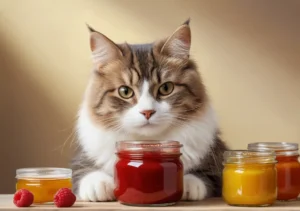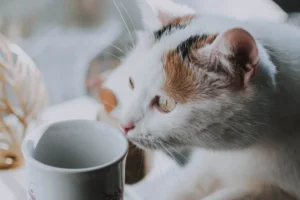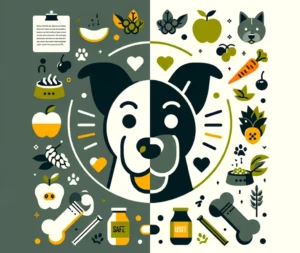Cats are known for their love of milk, but did you know that many cats actually have a dairy intolerance? In this blog post, we will explore why cats have trouble digesting dairy products and what you can do to keep your feline friend healthy and happy.
Understanding Dairy Intolerance in Cats
Alright, let’s get into the nitty-gritty of why so many cats can’t handle dairy. The main culprit here is lactose, a sugar found in milk. Cats’ bodies are not designed to efficiently break down lactose after they are weaned, leading to digestive issues when they consume dairy products. This lactose intolerance in cats can cause symptoms such as diarrhea, vomiting, and overall tummy troubles.
An interesting fact to note is that lactase, the enzyme responsible for breaking down lactose, decreases in production as cats age. This means that kittens might be able to tolerate dairy better than older cats. So, if your feline friend starts experiencing digestive woes after indulging in a saucer of milk, lactose intolerance could be the reason behind it.
Symptoms of Dairy Intolerance in Cats
Now, how can you tell if your furball is having issues with dairy? Look out for telltale signs like vomiting, diarrhea, bloating, or gassiness. These symptoms usually manifest within a few hours of your cat consuming dairy. If you notice your cat experiencing any of these discomforts after a dairy treat, it may be best to limit their milk intake.
One thing to keep in mind is that dairy intolerance varies from cat to cat. Some might handle a small amount of dairy just fine, while others react strongly even to the slightest sip. Pay attention to your cat’s reactions and adjust their diet accordingly. If you suspect dairy intolerance, try removing dairy entirely from their diet and see if their digestive issues improve.
Remember, just like humans, cats have their own dietary needs and sensitivities. Being aware of your cat’s tolerance levels can help keep their bellies happy and healthy. And always consult your veterinarian for more personalized advice on managing your cat’s dietary needs.
So, keep an eye out for those pesky symptoms and make sure to give your kitty the right treats that won’t upset their stomach. Your feline friend will thank you for it!
Why Do Cats Love Milk?
Cats’ love for milk is a tale as old as time, but the reality is, many felines can’t handle lactose. So why do they still seem drawn to it like a moth to a flame? Well, it all comes down to their early days as tiny kittens. Mother cats naturally produce milk to nourish their offspring, so kittens associate that comforting, warm feeling with the taste of milk.
It’s a bit like when you still crave your favorite childhood snack, even if it doesn’t sit well with you now. But fear not! You can satisfy your cat’s milk cravings with lactose-free options designed specifically for our dairy-intolerant fur babies. Look for specially formulated cat milk at your local pet store – your kitty will thank you!
How to Care for a Cat with Dairy Intolerance
If you’ve noticed that your cat’s tummy doesn’t agree with dairy products, it’s essential to respect their dietary needs. While a saucer of milk might seem like a sweet treat, it can quickly lead to upset stomachs and uncomfortable digestion for our feline friends.
Instead, opt for cat-friendly snacks and treats that skip the dairy. Keep an eye out for specialized cat treats that cater to their sensitive stomachs. And remember, water is always the best bet for keeping your cat hydrated and healthy. If you’re unsure about what foods are safe for your dairy-intolerant feline, a chat with your vet can provide tailored recommendations based on your cat’s unique needs.
Tips for Keeping a Dairy-Intolerant Cat Healthy:
- Check Labels: Always read the ingredients to ensure no dairy sneaks into your cat’s food or treats.
- Monitor Behaviors: Keep an eye out for any signs of discomfort or digestive issues after your cat consumes dairy.
- Consult Your Vet: If you have concerns or need guidance, your vet is the best source of advice for your cat’s diet and well-being.
Remember, a happy cat is a healthy cat, so skip the milk and opt for feline-friendly alternatives to keep your kitty purring contentedly.
Healthy Treat Alternatives for Cats
If your feline friend can’t handle dairy treats, don’t worry – we’ve got you covered with some fantastic alternatives! Instead of reaching for those dairy-filled goodies, you can opt for tasty treats like small pieces of cooked chicken, fish, or even freeze-dried meat. These protein-rich options will keep your cat happy and satisfied without any tummy troubles. Remember, cats are obligate carnivores, so they’ll appreciate these meaty treats just as much as dairy-based ones!
Interesting Facts About Cats and Dairy
Did you know that not all cats are lactose intolerant? While many adult cats have trouble digesting dairy due to a lack of lactase enzymes, some kittens can actually tolerate milk. This ability usually decreases as they grow older, but it’s fascinating to see how individual cats’ bodies react differently to dairy products. Another fun fact is that cats are drawn to the taste of milk because it’s high in fat, making it an appealing treat for them – even if their stomachs disagree. So, next time you see your cat eyeing that bowl of milk, remember that it’s more about the taste bud temptation than their actual dietary needs.
- Pro Tip: Did you know that lactase supplements are available for cats that love dairy but struggle with digestion? Consult your vet to see if this could be a good option for your lactose-sensitive feline friend.
Natural Remedies for Cat Digestive Issues
If your cat is struggling with digestive issues due to dairy intolerance, there are some natural remedies you can try to help alleviate their discomfort. One effective remedy is probiotics, which can help restore the balance of good bacteria in your cat’s gut and aid in digestion. Pumpkin puree is another great option as it can provide fiber to regulate your cat’s digestive system.
Digestive enzymes are also beneficial for cats with dairy intolerance as they help break down food more efficiently, reducing the chances of GI upset. Lastly, bone broth can be soothing for your cat’s digestive system and provide essential nutrients to support overall health.
Remember, it’s essential to consult with your veterinarian before introducing any new remedies to your cat’s diet to ensure they are safe and appropriate for your furry friend.
Conclusion: The Best Diet for Your Dairy-Intolerant Cat
In conclusion, maintaining a healthy diet for your dairy-intolerant cat is crucial for their well-being. Avoid feeding them any dairy products as they can cause gastrointestinal issues and discomfort. Instead, opt for high-quality, grain-free cat food that is specifically formulated for cats with sensitive stomachs.
Incorporate protein-rich foods like chicken, turkey, or fish into your cat’s diet to ensure they are getting the nutrients they need without compromising their digestive health. Supplement their diet with essential vitamins and minerals to support their overall health.
Remember, a balanced diet tailored to your cat’s individual needs is key to keeping them happy and healthy. Always prioritize their well-being when making dietary choices for your furry friend.
And if you’re looking for more information on cat nutrition and food options, check out this helpful resource from the American Association of Feline Practitioners: AAFP Feline Nutrition Basics.
Alex, a passionate animal lover, has experience in training and understanding animal behavior. As a proud pet parent to two dogs and three cats, he founded AnimalReport.net to share insights from animal experts and expand his knowledge of the animal kingdom.




